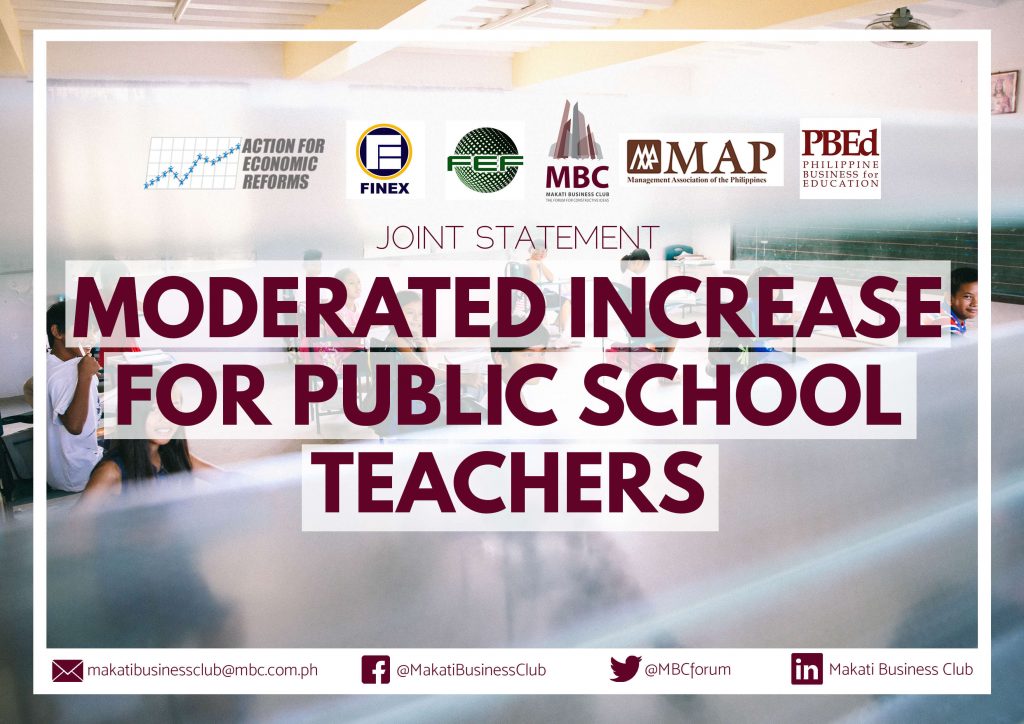
19 June 2019
We, the undersigned business and professional organizations, believe that better education is a top national priority. We need it to make the Philippines and Filipinos more competitive, secure and productive. We recognize, appreciate, and value public school teachers as central to this goal, aside from being important leaders of our communities, including during election time. They deserve to be compensated better and given better training opportunities and tools, and we join other sectors in making that a goal.
In light of recent demands for an immediate P10,000 a month increase, however, we ask President Duterte and the teachers to phase this over time considering the following:
- Fairness and equity of public school teachers’ pay compared to other civil servants, and the recent increases in their pay.
- Fiscal affordability and sustainability, and the competing demands for other essential public expenditures. These include other parts of the education sector itself, the health sector, social spending such as Conditional Cash Transfer (CCT), and investments in hard infrastructure. All these are needed to lift our people out of poverty, broaden and enrich the middle where our school teachers belong.
- The heavy economic and social effects, such as inflation, low growth, and unemployment, that go with spending beyond our means. This hits the poorest hardest.
On the issue of market competitiveness, in 2019, Teacher 1 (entry level salary grade 11) earned 58 percent more than their private school counterpart. An Associate Professor (salary grade 23) earned 109 percent more. According to the regional labor force survey, as early as 2016, public school teachers received on average 71 percent more than private school teachers nationally. This premium ranges anywhere from a low of 34 percent in Cordillera Autonomous Region to a high of 158 percent in the Autonomous Region of Muslim Mindanao.
Education Secretary Leonor Briones acknowledges salaries of public school teachers have “overtaken” those of private schools and debunks characterizations that they are “the most pitiful and lowest paid profession.” This is especially so in rural areas as the salary of public school teachers is standard nationwide. Compared to private teachers’ pay which is determined by local cost of living in the area they are working.
These market comparisons are important grounding — to deviate markedly from such would precipitate demands of one group of public servants vs. whoever is the current highest in a wage spiral that could lead to fiscal unsustainability. It could even spill over to private pay demands and inflation pressures.
Raising the disparity in pay between public and private school teachers would further fuel the migration of private school teachers to public schools and exert financial pressures on private schools whose tuition fees are regulated by government. Where public school teachers are disadvantaged compared to private school teachers is in the lack of training opportunities and tools like books, school supplies, and computers. There is also a lack of teachers and classrooms, resulting in big classes spread over the day in “shifts”. These must be addressed to alleviate the burden of teachers and improve the quality of education.
On the macro impact on the fiscal sector, the P150 B annual cost of the salary increase is roughly 1 percent of GDP. To appreciate the magnitude of this, we note that the entire annual budget for the CCT program, which benefits 4.3 million households and promises to break inter-generational poverty, will cost less than half of this. The difficult-to-pass TRAIN 1 raised less than half of this.
There is no identified recurring source of funding for this salary increase. As such, it will raise the national government annual fiscal deficit from 3 percent to 4 percent of GDP. The last time our fiscal deficit to GDP breached 4 percent was in 2002 and 2003, driving the country’s credit ratings down by two rungs. This led to higher borrowing cost to both government and private sectors, and lower investments. If the gains in managing our economy recently affirmed by the upgrade to just below “A” are put at risk, our public school teachers will also suffer.
There are numerous examples of economic collapse that trace to fiscal imprudence — unmanaged salary increases and poorly targeted subsidies. The most recent and very visible one is Venezuela.
We thus commend the efforts of the Secretaries of Finance, Education and Budget to improve the pay of our public school teachers while preserving the country’s economic gains. And we fully endorse the proposal of fiscal and education authorities for moderated adjustments in pay which are phased, reflect recent salary adjustments made, benchmarked to the market and other civil service employee comparators, count the benefits of TRAIN 1 on their take home pay, and are matched by new revenue. This should allow approach to the sought-for P10,000 salary increase over time.
ACTION FOR ECONOMIC REFORMS (AER)
FINANCIAL EXECUTIVES INSTITUTE OF THE PHILIPPINES (FINEX)
FOUNDATION FOR ECONOMIC FREEDOM (FEF)
MAKATI BUSINESS CLUB (MBC)
MANAGEMENT ASSOCIATION OF THE PHILIPPINES (MAP)
PHILIPPINE BUSINESS FOR EDUCATION (PBED)
